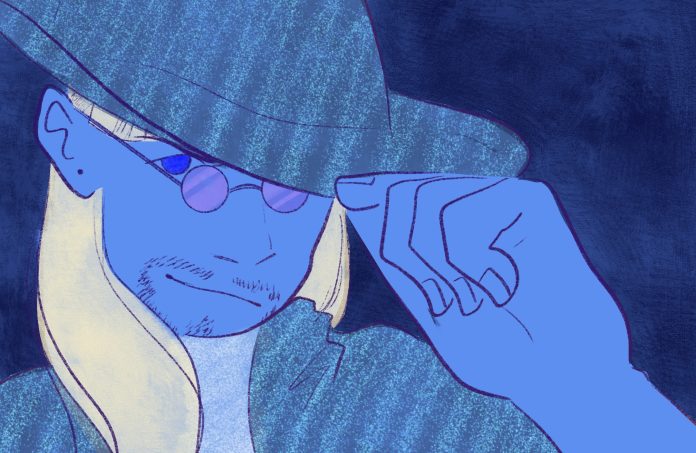Andy Knox
Staff Writer
Alternative pop artist and notable meme-lord Oliver Tree released his second full-length album, Cowboy Tears. In the lead-up to his first album, Ugly is Beautiful, Tree released an unrelenting flurry of covertly promotional content aimed at bringing his goofy pink and purple ski jacket, oversized jeans, and terrible bowl cut into the public consciousness. Cowboy Tears saw a similar social media campaign, with Oliver changing his look and calling himself a cowboy.
As part of the campaign, Tree insists the album be classified by Billboard as a country album — though one would have to be delusional or dishonest to call it country after listening. The cowboy aesthetic exists primarily on the surface, as Oliver’s voice still retains his unique, hypermodern, almost robotic sound seen in his previous work.
Almost all of the instrumentals sound synthetic, with the notable exception of a somber acoustic guitar accompanying Tree on every track. The cowboy gimmick manifests itself almost exclusively in Tree’s physical appearance, a few song titles, the aforementioned acoustic guitar, and some shallow references to the wild west.
Before even beginning to listen, one can tell the album will likely be disappointing; the first three tracks are all of the singles that were released prior to the album, preparing the listener for a steady decline in quality after the first three songs. That being said, the opening track, “Cowboys Don’t Cry,” serves as a nice introduction to the album’s theme of being a lonely cowboy. The acoustic guitar and wailing electric guitar sound in the background harmonize pleasantly, evoking feelings of being lonely in a desert. On the other hand, the lyrics are an unfortunately accurate preview of the songwriting quality throughout the record, with corny lines like “my cowboy tears are still blowing in the wind.”
The following two tracks, “Swing & A Miss” and “Freaks & Geeks” are both highlights, with some especially genuine lyrics and an overall catchy sound. “Swing & A Miss” explores anxiety about wasting one’s youth staring at screens while everyone else is going out, and wondering if all of society is doing it wrong by not being more love-oriented. Tree dedicates the latter track to people who were outcasts like he used to be, relaying his own experiences about being a weird kid and his current struggle to be taken seriously. Despite this desire, Tree’s voice throughout the album makes him sound like a rich teen from Orange County parodying his own voice, and that accent hits especially strangely when he sings “they gonna love ya until they hate ya” during the chorus.
“Doormat” represents the epitome of Tree’s lazy songwriting. In the chorus, each couplet’s first line is obviously filler to set up the next line, in which Tree says some generic negative phrase about people who treat others poorly. On the production side, the song highlights Oliver’s addiction to cutting the music before finishing a line for emphasis, which happens multiple times in the song and occurs far too many times throughout the album. “Suitcase Full of Cash” has a positive message discouraging materialism, but Oliver just has to fill it to the brim with Jaden Smith-level “deep” quotes like “Some people are so poor that all they have is money.” Lyrically, each song sounds like it was written in a few hours. The imagery, when present, sounds invariably cliche or contrived.
Tree sounds genuinely sorrowful at missing his home state on the track “California,” but for some reason, he focuses lyrically on the two narrow topics of wanting to be buried there when he dies and the state’s landmarks. San Francisco, the Hollywood Hills, and redwood trees are all beautiful, but Tree’s fixation on listing famous places makes the song come off as more pandering than personal. On top of all this, his singing in the chorus is painfully off-pitch.
The album has a few enjoyable tracks, and it wraps up nicely with “Cowboy Tears” where he tries to send an earnest, encouraging message to his fans with mental health issues. However, as a whole, it is simply bad. The cowboy gimmick not only sadly shatters expectations of an exciting new artistic direction for Tree, but it also made for some ridiculously cheesy lines that cheapen his songs’ messages. Though the record’s sound itself is inoffensive and the production is smooth, most of the backing tracks have the same basic sound of acoustic guitar over synthetic drums, which gets boring well before one has finished listening to all thirteen songs.
Rating: 3/10











